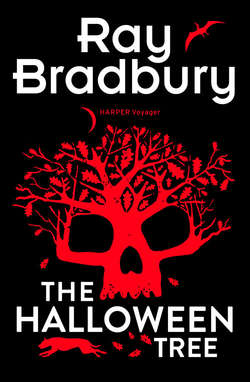Читать книгу The Halloween Tree - Рэй Брэдбери, Ray Bradbury, Ray Bradbury Philip K. Dick Isaac Asimov - Страница 6
Chapter 1
ОглавлениеIt was a small town by a small river and a small lake in a small northern part of a Midwest state. There wasn’t so much wilderness around you couldn’t see the town. But on the other hand there wasn’t so much town you couldn’t see and feel and touch and smell the wilderness. The town was full of trees. And dry grass and dead flowers now that autumn was here. And full of fences to walk on and sidewalks to skate on and a large ravine to tumble in and yell across. And the town was full of …
Boys.
And it was the afternoon of Halloween.
And all the houses shut against a cool wind.
And the town full of cold sunlight.
But suddenly, the day was gone.
Night came out from under each tree and spread.
Behind the doors of all the houses there was a scurry of mouse feet, muted cries, flickerings of light.
Behind one door, Tom Skelton, aged thirteen, stopped and listened.
The wind outside nested in each tree, prowled the sidewalks in invisible treads like unseen cats.
Tom Skelton shivered. Anyone could see that the wind was a special wind this night, and the darkness took on a special feel because it was All Hallows’ Eve. Everything seemed cut from soft black velvet or gold or orange velvet. Smoke panted up out of a thousand chimneys like the plumes of funeral parades. From kitchen windows drifted two pumpkin smells: gourds being cut, pies being baked.
The cries behind the locked house doors grew more exasperated as shadows of boys flew by windows. Half-dressed boys, greasepaint on their cheeks; here a hunchback, there a medium-size giant. Attics were still being rummaged, old locks broken, old steamer chests disemboweled for costumes.
Tom Skelton put on his bones.
He grinned at the spinal cord, the ribcage, the kneecaps stitched white on black cotton.
Lucky! he thought. What a name you got! Tom Skelton. Great for Halloween! Everyone calls you Skeleton! So what do you wear?
Bones.
Wham. Eight front doors banged shut.
Eight boys made a series of beautiful leaps over flowerpots, rails, dead ferns, bushes, landing on their own dry-starched front lawns. Galloping, rushing, they seized a final sheet, adjusted a last mask, tugged at strange mushroom caps or wigs, shouting at the way the wind took them along, helped their running; glad of the wind, or cursing boy curses as masks fell off or hung sidewise or stuffed up their noses with a muslin smell like a dog’s hot breath. Or just letting the sheer exhilaration of being alive and out on this night pull their lungs and shape their throats into a yell and a yell and a … yeeeellll!
Eight boys collided at one intersection.
“Here I am: Witch!”
“Apeman!”
“Skeleton!” said Tom, hilarious inside his bones.
“Gargoyle!”
“Beggar!”
“Mr. Death Himself!”
Bang! They shook back from their concussions, all happy-fouled and tangled under a street-corner light. The swaying electric lamp belled in the wind like a cathedral bell. The bricks of the street became planks of a drunken ship all tilted and foundered with dark and light.
Behind each mask was a boy.
“Who’s that?” Tom Skelton pointed.
“Won’t tell. Secret!” cried the Witch, disguising his voice.
Everyone laughed.
“Who’s that?”
“Mummy!” cried the boy inside the ancient yellowed wrappings, like an immense cigar stalking the night streets.
“And who’s—?”
“No time!” said Someone Hidden Behind Yet Another Mystery of Muslin and Paint. “Trick or treat!”
“Yeah!”
Shrieking, wailing, full of banshee mirth they ran, on everything except sidewalks, going up into the air over bushes and down almost upon yipping dogs.
But in the middle of running, laughing, barking, suddenly, as if a great hand of night and wind and smelling-something-wrong stopped them, they stopped.
“Six, seven, eight.”
“That can’t be! Count again.”
“Four, five, six—”
“Should be nine of us! Someone’s missing!”
They sniffed each other, like fearful beasts.
“Pipkin’s not here!”
How did they know? They were all hidden behind masks. And yet, and yet …
They could feel his absence.
“Pipkin! He’s never missed a Halloween in a zillion years. Boy, this is awful. Come on!”
In one vast swerve, one doglike trot and ramble, they circled round and down the middle of the cobble-brick street, blown like leaves before a storm.
“Here’s his place!”
They pulled to a halt. There was Pipkin’s house, but not enough pumpkins in the windows, not enough cornshocks on the porch, not enough spooks peering out through the dark glass in the high upstairs tower room.
“Gosh,” said someone, “what if Pipkin’s sick?”
“It wouldn’t be Halloween without Pipkin.”
“Not Halloween,” they moaned.
And someone threw a crabapple at Pipkin’s front door. It made a small thump, like a rabbit kicking the wood.
They waited, sad for no reason, lost for no reason. They thought of Pipkin and a Halloween that might be a rotten pumpkin with a dead candle if, if, if—Pipkin wasn’t there.
Come on, Pipkin. Come out and save the Night!
